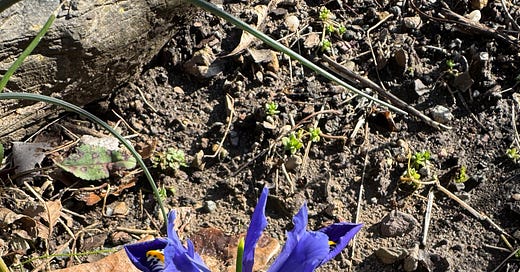Photo: the first iris of spring, March 8… about a month earlier than usual.
What does all this have to do with why we don't have tails?
Well, nothing, perhaps; or everything, depending on how you look at it. It's an allegorical question: what if the tail of our body is the place where our mind ought to be rooted?
Clearly enough, our mind needs to be rooted in something; and if it’s not rooted in our body, it has nowhere else to grow its roots. The mind needs to have a delicate beginning in its roots, a sturdy middle in the trunk of its action, and an end in what it leafs out and thinks.
But our minds, so to speak, have lost their minds; without a root to plant themselves in, they drift around in every direction and float aimlessly in the current of our lives like a water hyacinth. The water hyacinth is a beautiful flower, but it has no single place it calls home: it wanders around. Our mind does that also, because it has no tail, no root, no counterbalance to its flightiness.
In this allegory, our ape hasn’t lost its mind; it just can't keep it anywhere in one place for more than a minute. And losing its sense of this, it has also lost its diligence, its ability to obey, its sense of wholeness. It wanders around like a lost child, and we have no unity of being, no single sense of ourselves.
Keep reading with a 7-day free trial
Subscribe to Zen, Yoga, Gurdjieff: Lee's Gurdjieff Newsletter to keep reading this post and get 7 days of free access to the full post archives.





